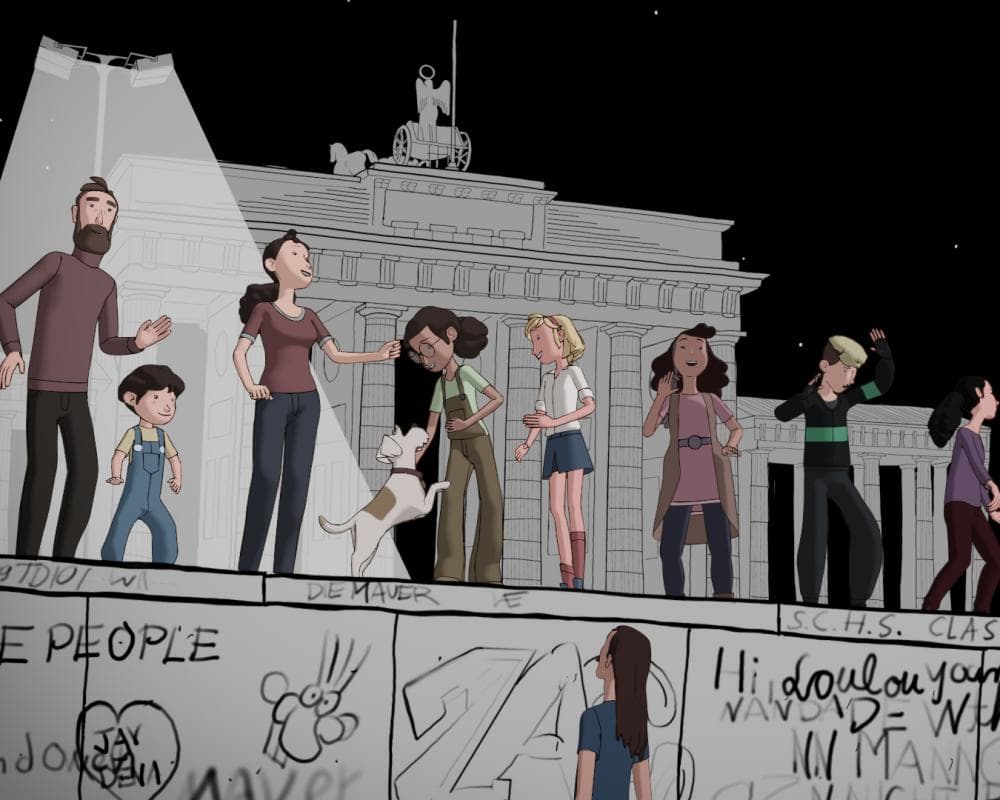‘No topic is too difficult’: children’s series on life in communist East Germany wins an Emmy

Click any word to translate
Original article by Kate Connolly in Berlin
The creators of a children’s television series about life in communist East Germany have said they hope it will awaken interest in the region’s history, after it was awarded an International Emmy.
Auf Fritzis Spuren (In Fritzi’s Footsteps) tells the story of a 12-year-old girl living in the eastern city of Leipzig and how she experiences life in the east and the events that lead to the fall of the Berlin Wall.
“It definitely shows that no topic is too difficult for children,” said the lead actor, Julian Janssen. “It’s precisely the difficult topics that should be addressed.”
The story is told by two animated avatars, Julian and Anna, who embark on a journey back in time to the GDR (German Democratic Republic), as protests are building against the regime. During their journey, they encounter individuals who grew up under communism and tell their own accounts of what it was like.
The animated six-part series was honoured in New York on Monday evening, making German film history for being the first German television programme for children to secure the award in the category Kids: Factual & Entertainment. Critics have praised the series for showing “how exciting history can be”.
Speaking after the ceremony in New York, co-director Ralf Kukula said: “We are completely stunned to have won with this topic. Political content for children isn’t usually the focus of such programmes … The fact that the story of a small girl from Leipzig who experienced the collapse of communism has now reached New York and won a big prize is sensational for us.”
He said the creators behind it had been been working on it for 16 years. “We started it in 2009 – and to be standing here now feels simply incredible.”
Anke Lindemann, the editorial head of child and family programming for Central German Broadcasting (MDR), said she hoped the recognition would mean that the show would now be seen not only by a global audience, but also by a wider public in Germany, where interpretations of the GDR often differ.
“When you come from the GDR, and grew up there like I did, and you know that – through this production – part of your childhood is being explained to children of today about what it was like, that’s quite special. Now that it’s reached New York, hopefully it means that everyone will now be talking about it,” she said.
In Fritzi’s Footsteps, aimed at children aged eight to 12 and their families, is set to follow films such as The Lives of Others and Good Bye, Lenin!, as well as TV thrillers Deutschland 83 and Kleo, as successful productions that have helped to bring the experience of life in the GDR to a wider audience.
The series switches between different parts of everyday life, from the classroom to the coal mine and the punk scene, and moves between documentary scenes and fictional ones, intermingling cartoon and real-world footage.
Episode one starts by explaining the East German authorities’ official justification for building the wall – as an “anti-fascist” protection barrier – and hints at the dangers faced by those who dared to question this explanation. It closes with an introduction to the secret police, the Stasi.
Kukula said that, at a time when Germany found itself deeply divided, any experience that reminded people of what they had in common was important.
“When adults and children watch the series together, and conversations between the generations arise as a result, then we’ve really struck home,” he told German media.
The series culminates in the heady days of the collapse of the Berlin Wall and charts the euphoria that followed. “We wanted to show what it was like when Germany was the happiest country in the world,” said Kukula, who also wrote the script. “I think it’s very important that we are able to remember that again.”